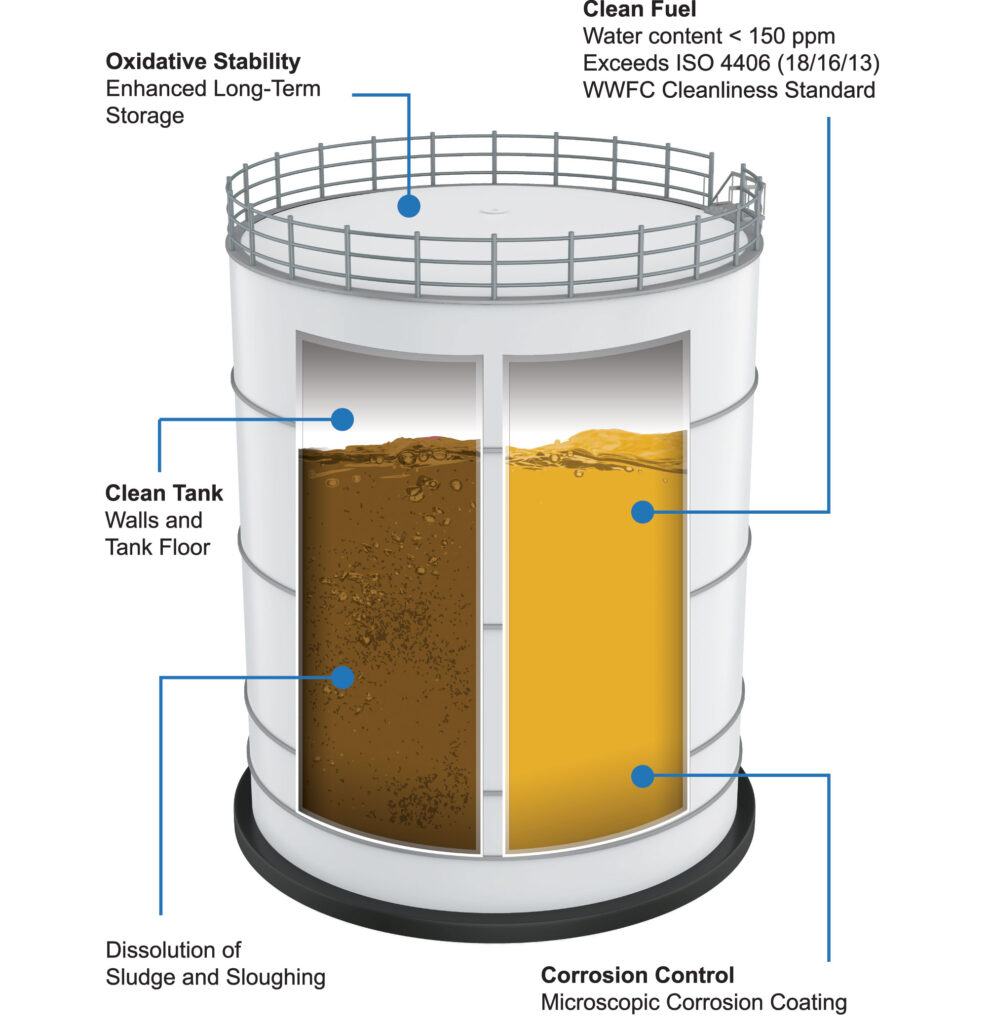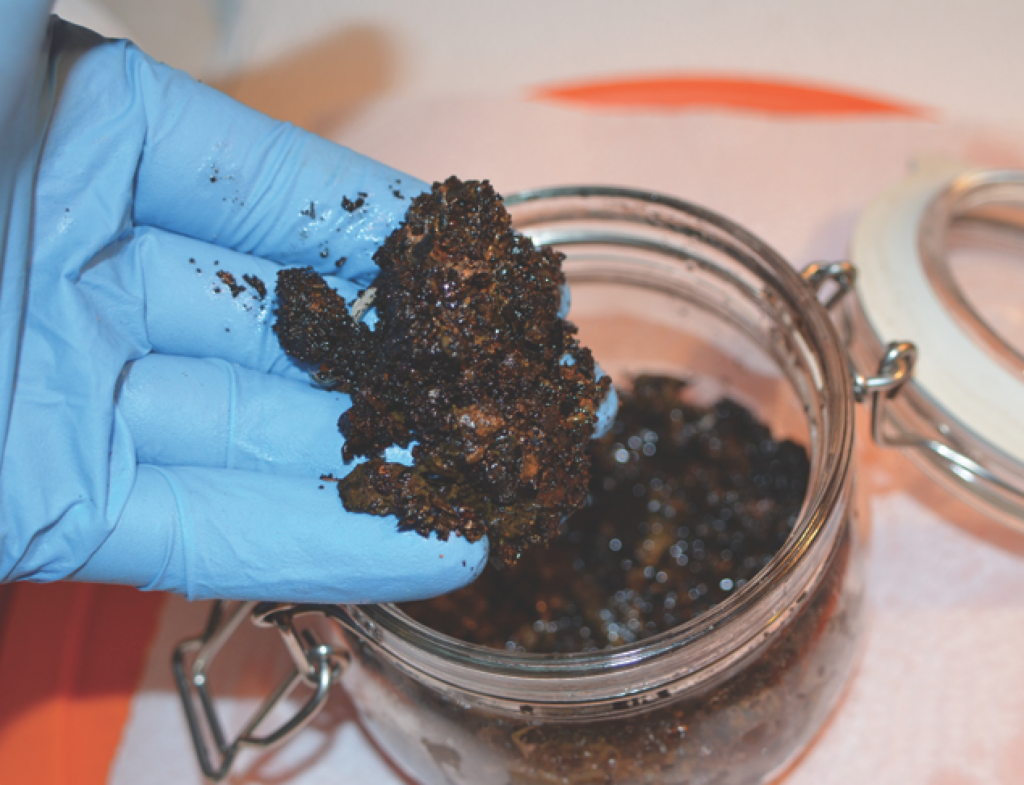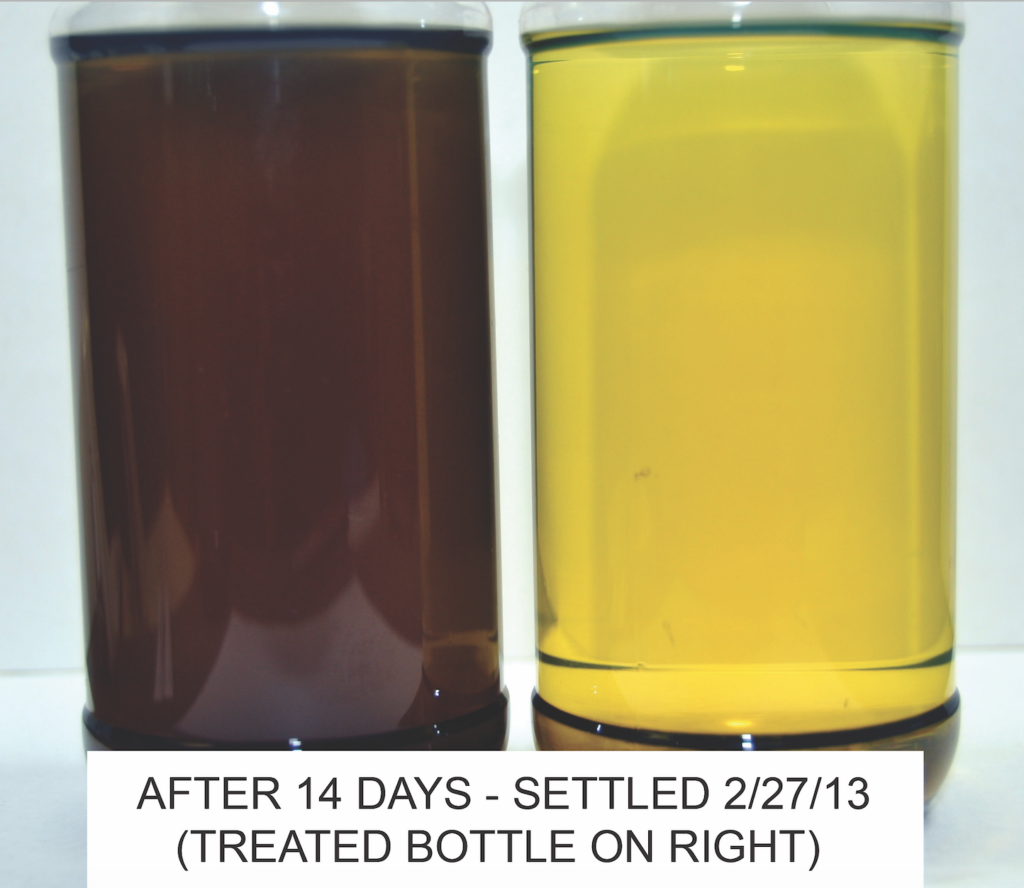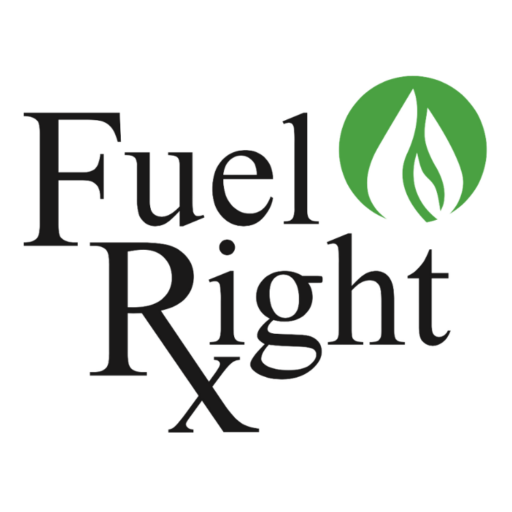TECHNOLOGY
Fuel Right is engineered to provide CLEAN, CLEAR FUEL in the tank ensuring OPTIMAL FUEL QUALITY free of sludge contamination, reduced particulate and water. The fuel tank is PROTECTED by a microscopic corrosion coating even in the presence of contamination and water. Fuel Right removes contamination throughout the fuel system resulting in EXTENDED FILTER LIFE and unrestricted fuel flow.
Fuel Right’s unique technology optimizes engine PERFORMANCE ensuring CLEAN INJECTORS, REDUCED EXHAUST EMISSIONS and IMPROVED FUEL ECONOMY.
Value proposition
Fuel Right starts by working immediately inside your tank. It begins by dissolving suspended sludge and pushing water to the bottom of your tank. It then continues to scrub away and dissolve degraded fuel deposits and sludge adhered to the tank walls, fuel lines, filter housings and any other fuel system component.
Fuel Right then deposits a microscopic corrosion coating that protects the entire fuel system from corrosion related to the presence of microbes and water while hindering future development of sludge deposits.
Once the tank is clean and protected from sludge contamination and corrosion, Fuel Right continues to clean filters and strainers so your fuel system is never starved due to filter blocking from unwanted sludge contamination.
Fuel Right delivers ultra-clean fuel to your engine. Clean injectors that operate efficiently with improved lubricity and enhanced fuel atomization results in better fuel economy and reduced emissions. This also ensured reduced carbon build-up in the cylinders.
From tank to engine, Fuel Right’s value proposition extends beyond that of conventional additives. Fuel Right is designed to meet and exceed the demand of modern high pressure common rail engines.

Clean, Clear Fuel
- Exceed ISO 4406 18/16/13
- No Water
- No Corrosion
Clean Filter Improves
- Fuel Flow
- Reduce Filter Demand
Optimize Injector Performance
- Improve Injector Life
- Optimize Fuel Economy
- Reduce Emissions
- Reduce Carbon Build-up

Clean, Clear Fuel
Exceed ISO 4406 18/16/13
No Water
No Corrosion

Clean Filter Improves
Fuel Flow
Reduce Filter Demand

Optimize Injector Performance
Improve Injector Life
Optimize Fuel Economy
Reduce Emissions
Reduce Carbon Build-up

Clean Fuel Tank and Filters
Fuel efficiency and performance begins with hygiene. Unless faced with catastrophic contamination issues, most do not pay attention to what is lurking in their fuel tanks.
Contamination and water is present in every tank and unless something is proactively being done to remediate it, you run the risk of filter plugging, injector failure and potential tank failure. The presence of water and contaminants in your fuel affect the following in your fuel storage;
- Decrease the effectiveness of corrosion inhibitors
- Decrease overall fuel oxidative stability
- Increase the fuel’s total acid number
- Reduce fuel lubricity
- Suspend higher levels of particulates, increasing engine wear and reducing injector life
- Reduce filter life
- Disperse a higher concentration of water, resulting in catastrophic fuel pump and injector failure
corrosion protection
Since the introduction of ULSD (Ultra Low Sulfur Diesel), the industry has experienced a rapid increase in corrosion related to the presence of sludge in the fuel tank. Fuel Tanks are more vulnerable to corrosion and premature failure.
Fuel Right deposits a microscopic corrosion coating that acts to protect tanks from corrosion even in the presence of sludge and water.

how it works
The samples shown were contaminated sludge and then the right sample was treated with a few drops of Fuel Right. The process of dissolving the suspended sludge is immediate. Within the first few days, the fuel is clarified and Fuel Right continues to dissolve any remaining sludge until the fuel is clear of contamination.




ISO 4406 WORLDWIDE FUEL CHARTER
The WORLDWIDE FUEL CHARTER is the collaborative effort of global engine manufactures and is designed to provide guidelines to fuel industry on stringent fuel quality standards required to meet the needs of modern engine technology. While the charter covers many aspects of fuel specifications, one key aspect is cleanliness
Particulate contamination and the presence of metals play a significant role in engine component wearand performance. ISO 4406 18/16/13 sets maximum allowable particulate count of up to 2500 particles/ml of fuel ranging from 4μ, 6μ and 14μ. Maximum allowable water content is 200 ppm. This current standard is already outdated with new engine technology and more stringent guidelines are predicted.
Fuel Right helps to clean fuel by breaking down particulate and pushing water out of the fuel. Our field testing has shown fuel cleaner by a factor of 8x better than the ISO 4406 standard and water content as low as 95 ppm. This equates to reducing particulate count from 2500 particles per ml of fuel to 320 particles. This improved cleanliness enhances engine component life significantly.
Why is this important? Modern high pressure common rail injectors operate under stricter tolerances than conventional injector designs. Reducing particle count plays a significant role in reducing injector failures and improved injector long term performance
Fuel Right has proven to be effective in multiple types of fuels including ULSD, unleaded fuels, bio-blends and heavy fuel oil.

ISO FIELD RESULTS
We have monitored many field tanks to determine how effective Fuel Right is at cleaning and maintaining fuel cleanliness based on the Worldwide Fuel Charter. Using various equipment such as laser particle counters and sending field samples out to independent laboratories for testing, we have consistently validated that Fuel Right plays a significant role in cleaning and maintaining a fuel cleanliness standard multiples cleaner than the current Worldwide Fuel Charter.
Below is a sample of results achieved in multiple underground tanks storing ULSD. It is important to note that these tanks were not cleaned prior to the introduction of a Fuel Right Fuel Program.

HOW LONG DOES THIS PROCESS TAKE?
Fuel Right is designed to take a conservative approach to cleaning tanks however, dose rates higher than shock dose can be used to accelerate the process. There are several stages in the cleaning process.
The first step to clearing up the fuel is to dissolve the suspended sloughing which will release water and particulate into the fuel.
The second phase includes the dissolution of the existing sludge usually residing at the bottom of the tank and on the tank walls. Fuel Right slowly releases the sludge from the tank walls and replaces it with a hydrophobic corrosion coating. The tank should be monitored for excessive water and insoluble particulates during this process and this residual water and contamination should be removed either through vacuuming the tank bottom or fuel polishing process.
Once the sludge is completely removed and the corrosion coating is in place, continuous use of Fuel Right will prevent further sludge development and will slowly work on improving the fuel cleanliness over time. Typically, the most dramatic improvement happens within the first few months of the program and then continually improve over time. Some of our programs have achieved results better than ISO 4406 13/10/8 and maintain exceptionally clean fuel systems.

Customers who have adopted Fuel Right’s ultra clean fuel program have seen dramatic improvement in filter life, reduction in tank cleaning (up to 90% reduction) and have reduced overall operating costs related to tank storage management.
protecting your complete fuel delivery system
We are frequently asked where to start treatment.
Fuel Right can be used at the main tank supplying the final source of fuel to your operation or, it can be used further upstream offering the benefits throughout your fuel delivery system.
The further upstream you treat, the better results you will achieve. As Fuel Right cleans the main terminal storage and protects it from sludge contamination and corrosion, the fuel delivered downstream will provide the same benefits throughout the fuel system.
Fuel Right is not only delivering exceptional benefits to your downstream customers, it is also protecting your operation from sludge contamination and corrosion reducing your overall operational costs significantly.

what our clients say

Hensall Co-Operative
“To stay competitive with the major refined suppliers of diesel fuel it was imperative that we source a diesel fuel additive to blend with conventional diesel to establish a premium diesel program. After extensive research on numerous fuel additives Hensall Co-op’s preferential choice was Fuel Right.”
